In the realm of foreign exchange (forex) trading, the broker you choose plays a pivotal role in your trading experience and success. With an overwhelming number of forex brokers in the market, making an informed decision is paramount. This article delves into the critical factors to consider when selecting a forex broker and how to ensure that your choice aligns with your trading goals.

Understanding the Role of a Forex Broker
The Gateway to Markets
A forex broker acts as an intermediary between the retail forex trader and the interbank forex market. The broker enables access to the trading platform, provides leverage, and facilitates the execution of trades.
Different Types of Brokers
Forex brokers can be broadly classified into market makers and ECN (Electronic Communication Network) brokers. Market makers create an internal market for their clients, often taking the opposite side of a client’s trade. ECN brokers, on the other hand, connect traders directly to the interbank market.
Regulatory Compliance and Security
Ensuring Proper Regulation
Before entrusting your capital to a forex broker, it’s crucial to ensure that reputable financial authorities regulate them. Regulatory bodies such as the Financial Conduct Authority (FCA) in the UK, the US Commodity Futures Trading Commission (CFTC), or the Australian Securities and Investments Commission (ASIC) enforce stringent standards to safeguard traders.
Segregation of Funds
Another security aspect to consider is whether the broker segregates client funds from its own operating funds. This practice is vital as it ensures that the broker does not use client funds for operational purposes and are protected in case the broker goes bankrupt.
Trading Costs and Conditions
Spreads and Commissions
Trading costs are a significant consideration. Brokers typically make money through spreads (the difference between the bid and ask price) or commissions on trades. Opt for a broker offering competitive spreads and commissions without compromising service quality.
Leverage and Margin Requirements
Leverage enables traders to control a larger position with a small amount of capital. While this can amplify profits, it also increases risks. Assess the leverage the broker offers and ensure that it aligns with your risk tolerance and trading strategy.
Execution Speed
Fast trade execution is critical, especially in a market as volatile as forex. Ensure that the broker offers reliable trade execution without frequent requotes or slippage.
Trading Platform and Tools
Assessing the Trading Platform
The trading platform is your portal to the markets. Look for a user-friendly platform with robust charting tools, technical indicators, and a stable trading environment. MetaTrader 4 and MetaTrader 5 are popular choices among forex traders.
Availability of Educational Resources
For beginner traders, educational resources are invaluable. Check if the broker offers educational materials, webinars, and market analysis to help you make informed trading decisions.
Customer Service
Importance of Support
Reliable customer service is essential. Check if the broker offers multi-channel support, including phone, email, and chat. Also, consider the responsiveness and quality of the support provided.
This article was last updated on: July 3, 2023
